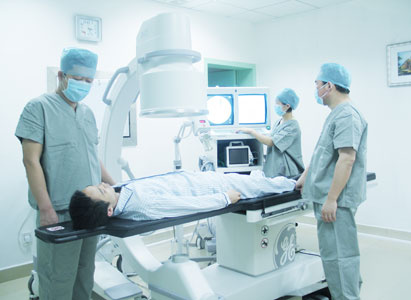
Liver metastasis is one of the common causes of death in breast cancer patients. In 2013, ASCO carried a study on liver metastases of solid tumors. By a comparison between the remission rate (RR) and overall survival time (OS) of hepatic trans-catheter arterial chemo-embolization (TACE)in breast cancer patients with liver metastases, they found that hepatic arterial chemo-embolization can be used as an independent and effective treatment method to prolong the survival time of breast cancer patients with liver metastases.
The test has a retrospective analysis on 14 cases of breast cancer patients with liver metastases. They make one or multi-embolismic points in the patient’s lesion, to assess the progression and overall survival time of breast cancer patients with liver metastases before and after TACE. The result found that among these 14 cases who have received hepatic arterial chemo-embolization (TACE), one patient’s discomforts are complete remised, four achieved partial remission, and other four are stably controlled, while 5 patients have no obvious reactions. For patients who have response to TACE treatment, the progression time of the disease was 13.2 months, while 2.9 months for those who show no response. In addition, the overall survival time of patients who responded well to the treatment is up to 25.6 months.
Researchers said:" Based on our experience, chemo-embolization can provide breast cancer patients with liver metastases effective treatment options, and the patient's responses are very different from the previous systematic treatments. This prolongs the patient’s survival time effectively."
Decipherment from Director Wang Ronghua, Modern Cancer Hospital Guangzhou, China
Wang Ronghua explained that the efficacy of chemo medicine relies on not only the pharmacological effects of drugs and the patient’s sensitivity, but also the drug concentration in the lesion sites and total reaction time. Also, different routes of drugs administration play an important role. In the past, the main administration mode of chemo drugs is intravenously or orally given. By which, the drugs are fully diluted and mixed with protein after systemic circulation. So when it finally arrival at the targeted organ, the effects of medicine are almost already depleted, far from having good treatment effects for the patients, instead, this may increase the toxicity and side effects. Therefore, to improve efficacy together with reduce side effects at the same time by conventional means is almost impossible. However, the emergence of arterial infusion therapy reversed this situation. By arterial embolization, chemo drugs or suppositories are inserted into the feeding arteries of the targeted organs, by which, the drug concentration is increased, and the drug contact time with the targeted organ is prolonged. This manner blocks the blood supply of the tumor, efficiently kills the cancer cells and achieves the purpose of shrinking tumors. On the other hand, since the chemo medicine is applied through arterial infusion, the drug concentration in the peripheral blood will not increase, which means that the body's normal tissue cell damage is smaller. Eventually, the toxicity and side effects of the treatment will be reduced.
Arterial chemo-embolization belongs to local minimally invasive treatment. With small trauma, less pain, it is widely applied in the treatments of various cancers like liver cancer, breast cancer, cervical cancer, lung cancer, colon cancer, nasopharyngeal cancer, stomach cancer, bladder cancer, and pelvic tumors. It can be used as routine and palliative treatments before or after surgery. Besides, for advanced stage cancer patients complicated with bleeding, arterial embolism can also be used to block the blood vessels to control bleeding.
Here are the patients from Modern Cancer Hospital Guangzhou who undergone Chemoembolization Treatment
From: Indonesia
Case: Invasive Ductal Carcinoma Grade II
“At the age of 47, I was diagnosed with cancer. I was frightened, but I want to keep living. Upon detection, I had egg-sized breast mass. I didn’t opt for mastectomy since I’m afraid of surgery. Instead I went to Modern Cancer Hospital Guangzhou for Interventional Treatment and Cryotherapy Treatment. The tumor basically disappeared after treatment. Life has new hope.”......read
 < Do not fear cancer, believe in yourself>
< Do not fear cancer, believe in yourself>
From: Bangladesh
Case: Signet Ring Cell Carcinoma with Peritoneal Metastasis
“Due to unbearable abdominal pain, a Bangladesh doctor performed exploratory laparotomy, unfortunately surgery cannot be done due to advance stages of disease. Finally, I decided to come to Modern Cancer Hospital Guangzhou. I was able to complete 5 sessions Interventional Treatment + 1 session Iodine Seed implantation. My condition was monitored closely before and after treatments. During re-evaluation, tests results makes me happy and my condition was improved.”......read
 < Treatment and Patient Care Helped Me Conquered My Fear >
< Treatment and Patient Care Helped Me Conquered My Fear >
From: Cambodia
Case: Small Cell Lung Cancer
“I underwent 6 cycles of Chemotherapy in Vietnam, but the cancer cells continued to spread. I cannot perform basic activities like brushing teeth, grooming and descend stairs. My husband felt distressed, can’t bear to see me suffering. This made him decide to bring me to Modern Cancer Hospital Guangzhou to seek hope. I was able to complete 2 sessions of Interventional therapy + 1 session of Cryotherapy Treatment with remarkable results since the tumor shrunk by 2/3 from original size. We are no longer afraid, can’t wait to start new life my husband and children.”.......read
*Surgery, in addition to the appropriate chemotherapy and radiotherapy, are effective in treating early cancer, but certain patients in late stage of cancer may not be tolerate surgery well as they can be relatively weak. A combination of carefully planned minimally invasive therapy, chemotherapy or radiotherapy can effectively reduce the side effects and discomfort of treatment and may help patient get better efficacy.














 viber
viber